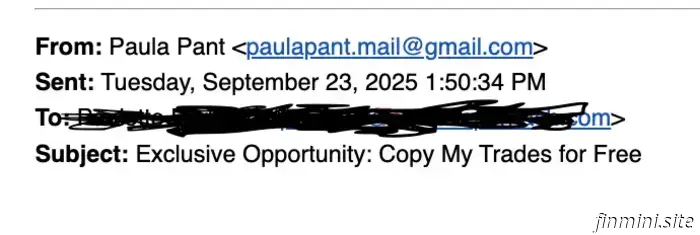
This is a bit embarrassing. Someone is impersonating me via email.
I've encountered impersonators on Instagram for years (until I finally got that blue checkmark!), but this is the first time I've been impersonated through email.
Someone has created a fake email address and managed to scrape the email addresses of my Instagram followers to send out scammy messages about an "exclusive trading opportunity."
The fraudulent emails are sent from paulapant.mail (at) gmail (dot) com, with subject lines like "Exclusive Opportunity: Copy My Trades for Free."
That’s definitely NOT me — please do not engage, respond, or click on anything if you receive one.
Genuine emails from me will always come from [email protected] or [email protected], and will include an unsubscribe link at the bottom.
Here’s what we are doing about it: We’ve reported this to Google and filed a complaint with the federal government’s Internet Crime Complaint Center. We're on top of it.
The silver lining: I texted my 84-year-old dad to inform him about this scam. I fully anticipated a reaction of panic or concern and braced myself for a series of questions or perhaps a lecture on catching these criminals.
However, I received the ultimate dad response:
Peak dad energy right there 😂
Turning this into a learning moment: Since we’re discussing scammers, this seems like a good time to mention the podcast interview I had with Dr. Eric Cole, a cybersecurity advisor under President Obama and security advisor to Bill Gates.
We conducted an in-depth discussion on how to protect yourself from scams, and one viewer mentioned it was “perhaps the most helpful video I’ve ever seen.”
Dr. Eric Cole is a former CIA hacker who explains the most common attacks targeting your finances.
We talked about bank hacking, which is more straightforward than many people think. All criminals need is your account number — found on every check you write — along with your password. With that information, they can often make electronic fund transfers of up to 50 percent of your account balance without triggering alerts. Yikes!
We also covered phishing scams, including counterfeit Amazon emails. (Nothing against Amazon, but due to their size, they are frequently spoofed.)
Additionally, we explored the numerous ways you could lose the contents of your cryptocurrency wallet. (It’s truly the Wild West.)
He shared the story of a couple in Ohio — teachers who had hoped to buy a small farm — that lost their $1.3 million inheritance in a wire transfer scam.
If you want to learn how to safeguard your assets, check out our interview with Dr. Eric Cole on YouTube or listen to the podcast here.
Dr. Eric Cole discusses Cybersecurity
In the meantime —
If you receive any suspicious emails claiming to be from me, please forward them to [email protected] so we can keep track. Thank you!


Discover how to identify an email scam, safeguard your personal information, and steer clear of phishing attacks that threaten your finances and online safety.